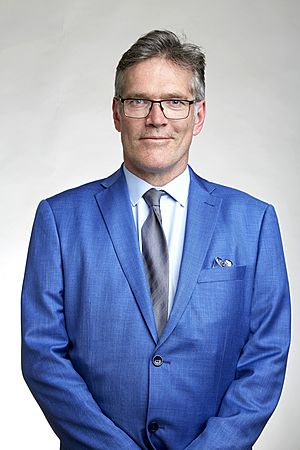Gregory Edgecombe facts for kids
Quick facts for kids
Gregory Edgecombe
|
|
|---|---|

Edgecombe in 2018
|
|
| Alma mater | Acadia University University of Alberta Columbia University |
| Awards | Fenner Medal (2004) |
| Scientific career | |
| Fields | |
| Institutions | University of Alberta Australian Museum Natural History Museum, London |
| Thesis | Systematic studies on the trilobite order Phacopida (1991) |
| Doctoral advisor | Niles Eldredge |
Gregory Donald Edgecombe is a famous paleontologist who studies ancient life, especially fossils. He works at the Natural History Museum, London. Dr. Edgecombe is a top expert in understanding how arthropods, like insects and spiders, have changed over millions of years. He also studies how fossils help us understand the family tree of all animals. He is also an expert on centipedes and how their bodies are built.
Becoming a Scientist
Dr. Edgecombe studied at Columbia University to earn his PhD degree in 1991. His studies focused on trilobites, which are ancient sea creatures that are now extinct. His work was guided by Niles Eldredge at the American Museum of Natural History.
Dr. Edgecombe's Career
After finishing his PhD, Dr. Edgecombe worked as a researcher at the University of Alberta. He then spent 14 years as a researcher at the Australian Museum in Sydney. In 2007, he moved to the Natural History Museum, London. Since 2013, he has been a special researcher there.
In March 2020, Dr. Edgecombe co-wrote a textbook called The Invertebrate Tree of Life. He wrote this book with Gonzalo Giribet. It helps explain the family tree of animals without backbones.
Awards and Recognition
Dr. Edgecombe has received several important awards for his work. In 2004, he was given the Fenner Medal for his excellent research in biology. This award came from the Australian Academy of Science. In 2011, he received the president's medal from the Palaeontological Association.
He was also chosen to be a Fellow of the Royal Society (FRS) in 2018. This is a very high honor for scientists in the United Kingdom. In 2024, a new type of ancient arthropod was named after him. It is called Lomankus edgecombei.

